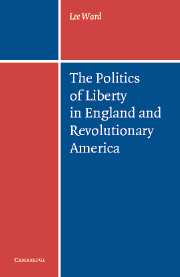Book contents
- Frontmatter
- Contents
- Acknowledgments
- Introduction: Reexamining the Roots of Anglo-American Political Thought
- PART ONE THE DIVINE RIGHT CHALLENGE TO NATURAL LIBERTY
- PART TWO THE WHIG POLITICS OF LIBERTY IN ENGLAND
- 4 James Tyrrell: The Voice of Moderate Whiggism
- 5 The Pufendorfian Moment: Moderate Whig Sovereignty Theory
- 6 Algernon Sidney and the Old Republicanisms
- 7 A New Republican England
- 8 Natural Rights in Locke's Two Treatises
- 9 Lockean Liberal Constitutionalism
- 10 The Glorious Revolution and the Catonic Response
- 11 Eighteenth-Century British Constitutionalism
- PART THREE THE WHIG LEGACY IN AMERICA
- Conclusion
- Bibliography
- Index
6 - Algernon Sidney and the Old Republicanisms
Published online by Cambridge University Press: 28 October 2009
- Frontmatter
- Contents
- Acknowledgments
- Introduction: Reexamining the Roots of Anglo-American Political Thought
- PART ONE THE DIVINE RIGHT CHALLENGE TO NATURAL LIBERTY
- PART TWO THE WHIG POLITICS OF LIBERTY IN ENGLAND
- 4 James Tyrrell: The Voice of Moderate Whiggism
- 5 The Pufendorfian Moment: Moderate Whig Sovereignty Theory
- 6 Algernon Sidney and the Old Republicanisms
- 7 A New Republican England
- 8 Natural Rights in Locke's Two Treatises
- 9 Lockean Liberal Constitutionalism
- 10 The Glorious Revolution and the Catonic Response
- 11 Eighteenth-Century British Constitutionalism
- PART THREE THE WHIG LEGACY IN AMERICA
- Conclusion
- Bibliography
- Index
Summary
Algernon Sidney and his Discourses Concerning Government cut a striking figure even among the colorful cast of characters in English Whiggery. Whereas the Cavalier country squire Tyrrell was self-consciously moderate and measured in tone, Sidney's argument is bellicose, incendiary, and defiantly republican. He was born in 1622, the scion of two illustrious aristocratic families, the Sidneys and the Percys. His father was the second earl of Leicester and his mother was the daughter of the ninth earl of Northumberland. His ancestors included the famed Elizabethan courtier, warrior, and poet Sir Philip Sidney and the proud, warlike, aristocratic rebel Hotspur, immortalized in Shakespeare's history plays. His youth was spent divided between the family estate in Kentshire at Penshurst and living with his diplomat father on assignments in Denmark and France in the 1630s, where the second earl met and came to know Grotius and other leading continental thinkers.
As was true of most Englishmen of his generation, the formative experience of Sidney's life was the civil war. Ironically, the man who would become so clearly identified with the “old cause” of the Commonwealth actually began the war in royal service in Ireland but took up the parliamentary cause upon his return to England in 1643. By all accounts, he served gallantly as an officer in the earl of Manchester's Horse Regiment and was seriously wounded in a charge at Marston Moor in 1644.
- Type
- Chapter
- Information
- The Politics of Liberty in England and Revolutionary America , pp. 152 - 171Publisher: Cambridge University PressPrint publication year: 2004



